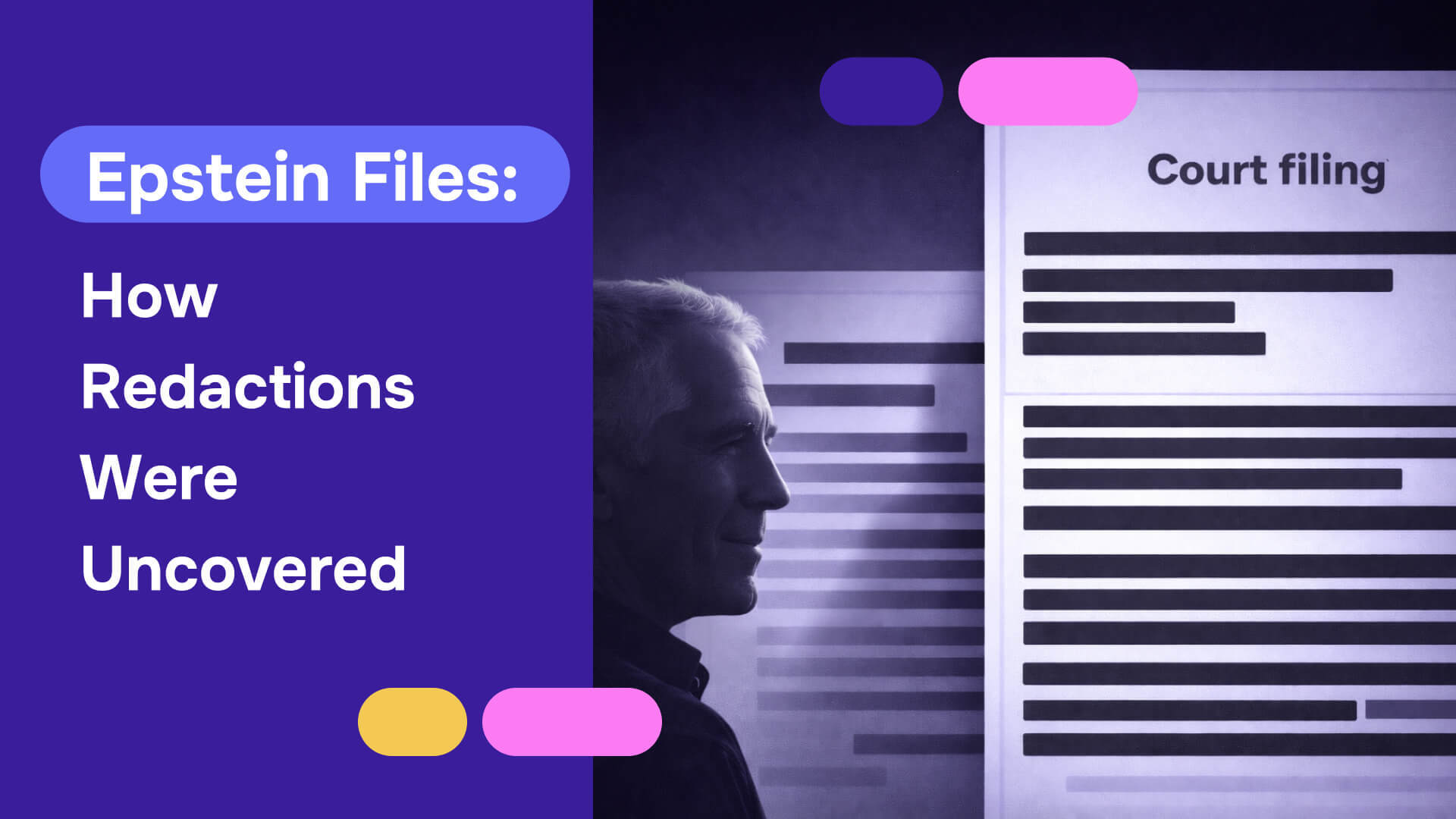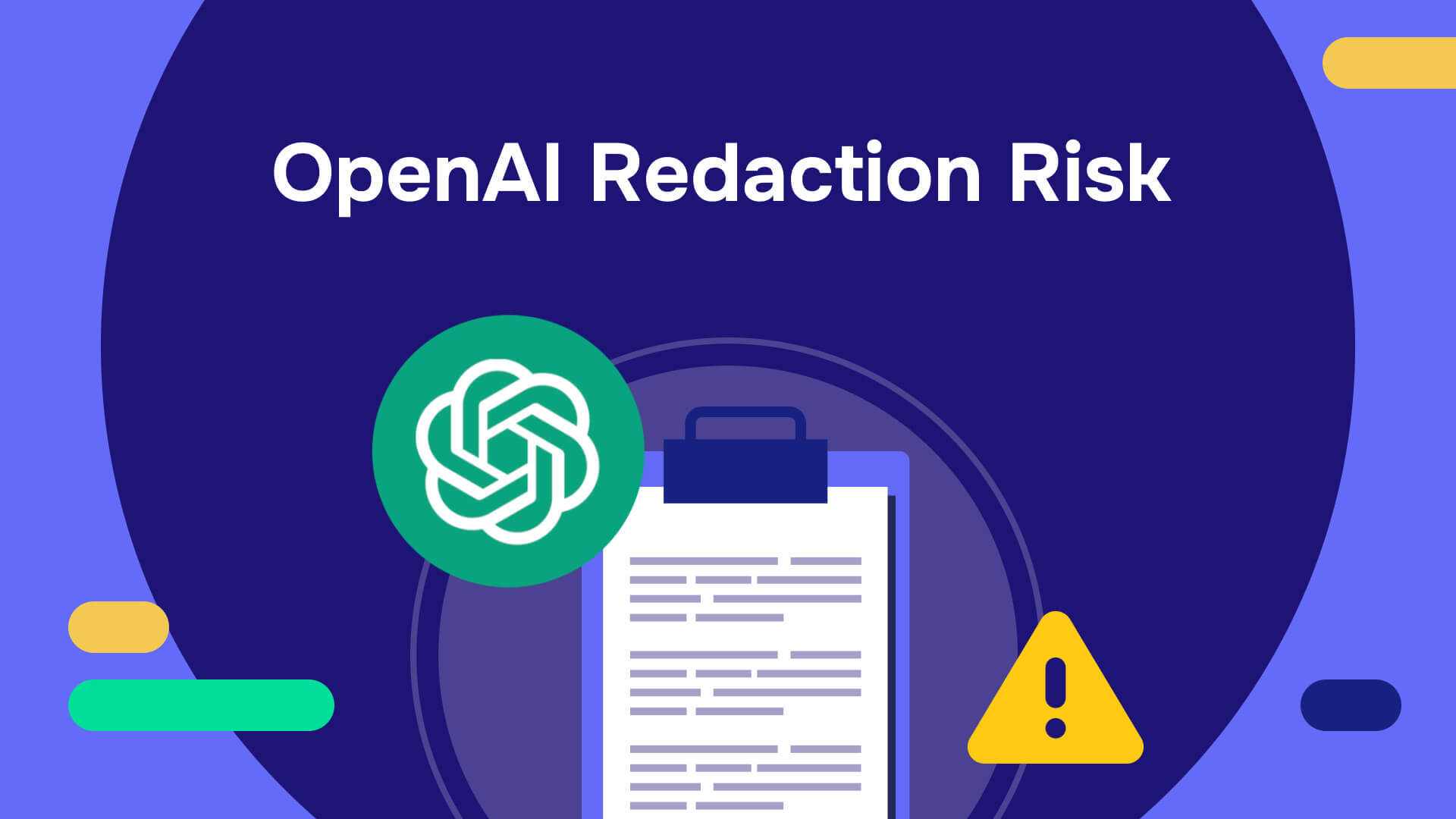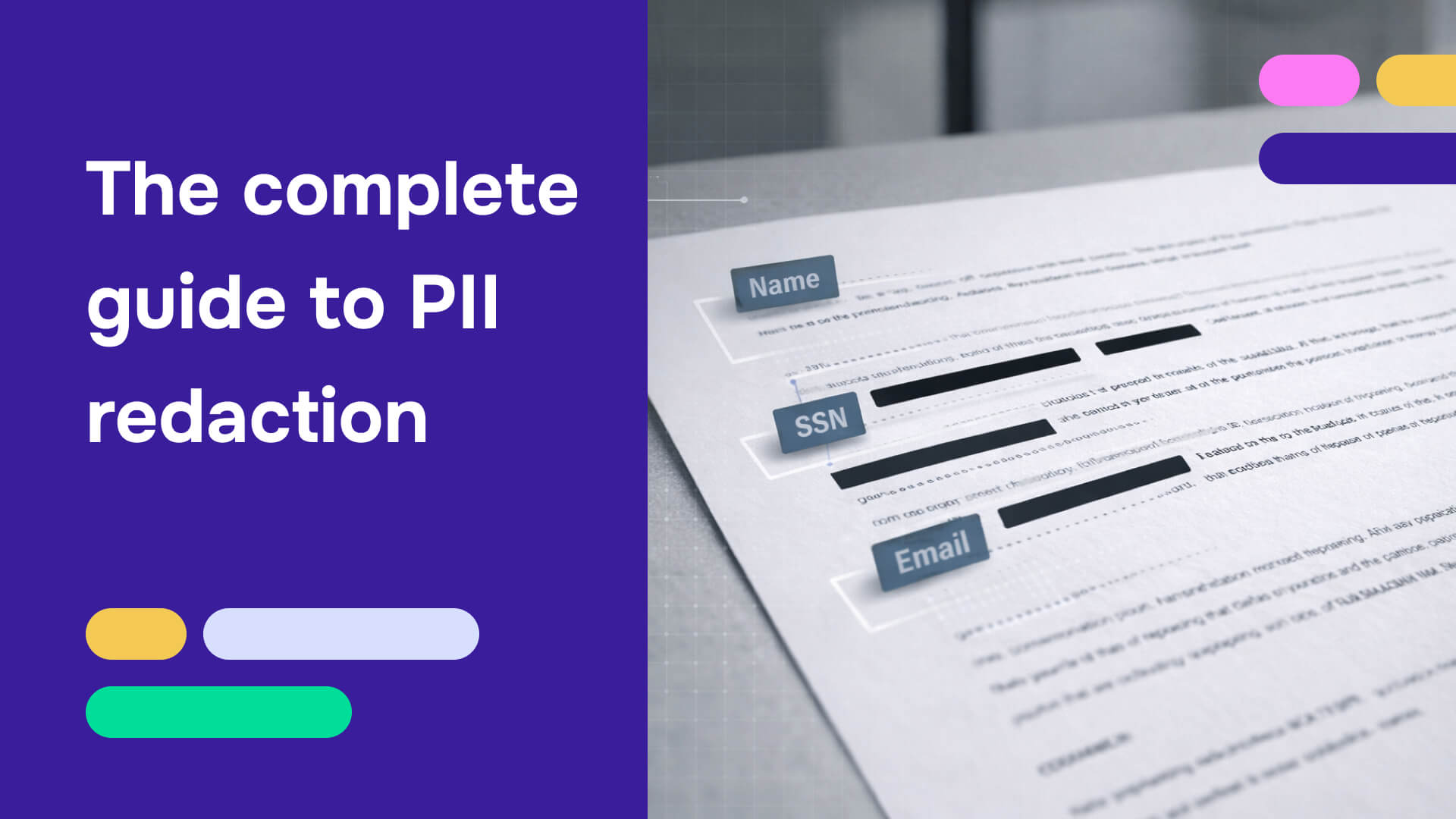Digital solutions have made banking services more accessible over the years. However, while digital banking and online transactions undoubtedly offer convenience and speed, they also come with several concerns - including privacy.
For instance, what happens when you need to share your bank statement for verification purposes?
From loan applications to lease agreements, many processes require users to send a bank statement to ensure approval. Unfortunately, this also opens users to the risk of exposing sensitive information.
So, how do you protect your private info without compromising the details you want to share? Keep reading as we explore what a redacted bank statement is, how redaction can shield your private data from prying eyes, and how to leverage it.
What is a redacted bank statement?
Redacting a bank statement is the process of hiding or blocking out sensitive information in a document before sharing it with third parties. This is typically done by placing black bars or boxes over the said details, effectively ensuring that no third party can access them.
Without proper redaction, you may be exposing yourself to security threats, such as account breaches or identity theft.
A good rule of thumb when redacting any document (such as your bank statement) is to mask any Personally Identifiable Information (PII) that could expose you to security risks. For instance, you need to redact details of your account number and social security number.
By using a redacted billing statement, you ensure that the third parties you’re transacting with can use the financial information they need while protecting your sensitive details.
That said, let us examine the specific information you may need to redact in a bank statement.
How to redact a bank statement?
There are several ways you can redact your private details on a bank statement. Here are three options to consider when you need to redact a bank statement:
1. Manual redaction
This typically only works if you’re handling physical documents, such as a printed copy of your bank statement. In this case, you can use a black marker to cover sensitive details by drawing a line or two over them. Then, you can scan the redacted billing statement if you want to use it digitally.
However, one drawback of manual redaction is that the marker ink is often not thick enough to completely mask the information you want to redact. In many cases, holding the paper up to light will reveal the information behind the ink.
So, if you’re sending out your bank statement by physical mail, take extra care to ensure that the underlying text is not visible from either the front or back of the paper.
2. Using PDF editors
If you have a digital copy of your bank statement, you can redact some of the information in it by using a PDF editor. Common options include Adobe Acrobat, Foxit PhantomPDF, or Preview (if you use a Mac).
These PDF editors offer users built-in redaction features to black out sensitive information such as account numbers, personal details, or specific transaction data.
Don’t forget to keep a copy of the original document, though!
Read also: How to redact a PDF: A complete guide with video tutorials
3. Using dedicated redaction tools
Today, several software tools provide users with redaction features to enable them to mask sensitive information in documents easily. Some of these tools even have advanced features that automatically detect the information that needs to be redacted and mask it to protect your privacy.
An example is Redactable.
Redactable is a tool specifically designed to mask personal information in documents. Simply upload your bank statement to the platform, and Redactable will help you cover up confidential information easily and seamlessly.
This is particularly useful if you have a large volume of documents to work through or frequently have to redact documents in your workflow.
How to redact bank statements using Redactable

Redactable is a cloud-based redaction platform designed to help you redact your documents so your confidential information remains safe and secure. This tool is also equipped with machine learning algorithms that can automatically detect and redact sensitive information from your bank documents, effectively cutting down your work time.
Step-by-step guide
1. Upload your document: Begin by uploading your bank statement to our platform for redacting sensitive information:

2. Select sensitive content: Use AI features to identify and highlight sensitive information, including
- Account numbers
- Social Security numbers
- Personal addresses
- Credit card details

Here are some more appealing features of Redactable:
- Leverages AI to quickly find sensitive information in your bank statements
- Optimal Character Recognition (OCR) capabilities that allow it to redact scanned documents accurately
- File management systems to keep your documents organized and your workflow smooth
- Collaborative redaction with teammates using a cloud-based system complete with redaction logs
- Document scrubbing to remove metadata to ensure that redaction cannot be reversed
Redactable offers users three free document redactions before they need to subscribe to the paid version and unlock the full potential of its efficiency and time-saving capabilities.
3. Review and adjust: Carefully verify the automated selections to make sure no sensitive details were missed, and manually flag any additional information that needs to be redacted. Once the redaction process is finished, proceed to verify the document’s security to ensure all sensitive data has been properly removed.
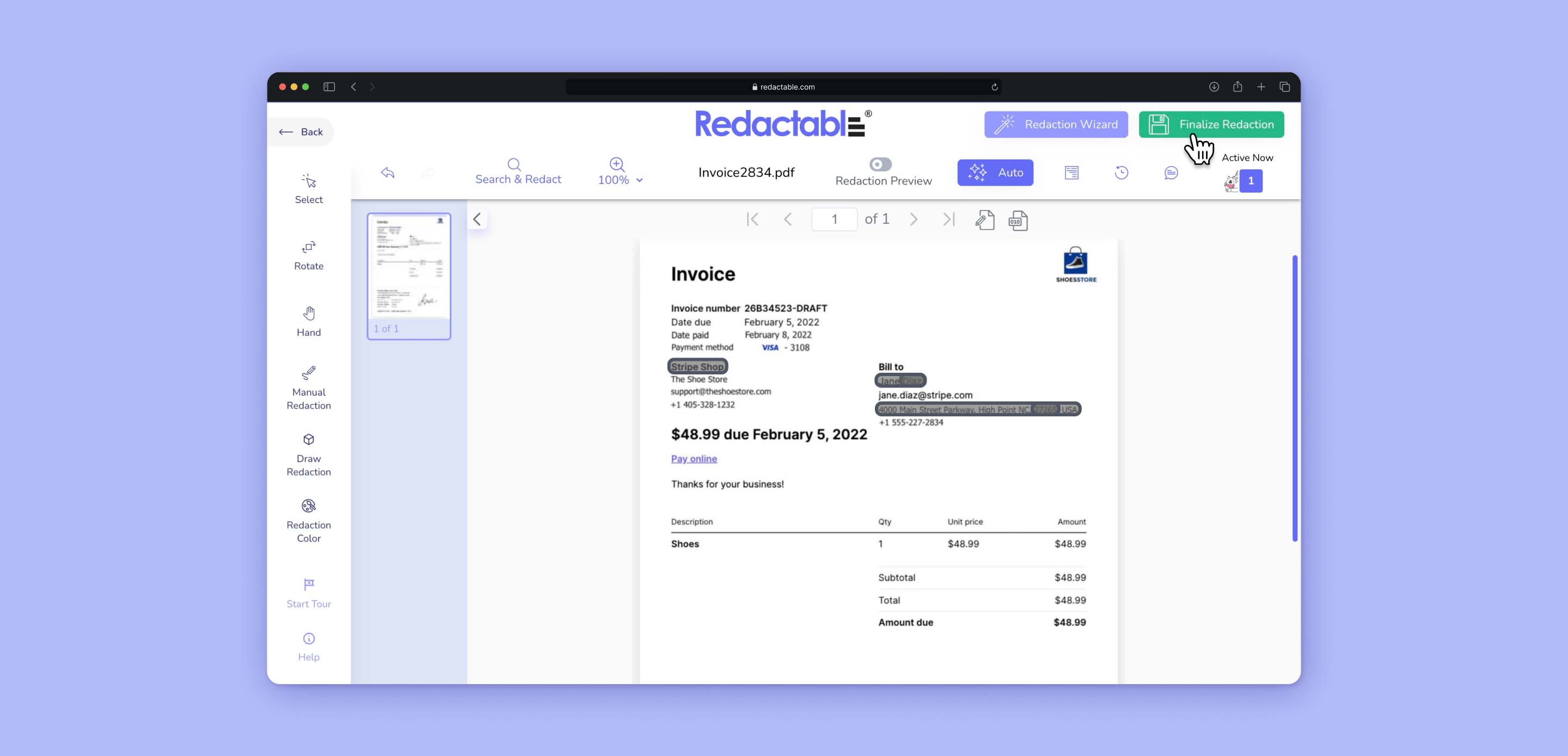
Watch the video below to see how easy it is to redact bank statements with our redaction tool:
Final security checks
After redacting, confirm the bank statement meets all security standards.
- Document review: Carefully inspect the following areas for any overlooked information:
- Headers and footers
- Transaction details
- Account summaries
- Recurring payments
- Technical verification
- Ensure redacted information cannot be restored.
- Check that metadata has been completely removed.
- Save the document in a secure format.
- Before sharing the document:
- Confirm metadata has been scrubbed.
- Save the final version in a secure, non-editable format.
Proper redaction doesn't just hide information - it removes it entirely. This ensures sensitive data is safe while keeping the document reliable for its intended purpose.
What information should you redact in a bank statement?
There’s no one-size-fits-all approach to redacting information in a bank statement.
But redaction is typically used to protect personal details such as:
- Account Number
- Social Security Number
- Transaction details
- Residential address
- Email address
- Card details (if applicable)
- Balances (in some cases)
- Phone numbers
You should note that while a redacted bank statement is essential to protecting yourself, you also need to strike a balance.
Redacting too much information may affect the document's ability to provide the details the transaction organization needs. It may even raise questions regarding the authenticity of your bank statement. Therefore, it is always a good idea to leave information that may be irrelevant to your specific transaction as long as it’s not confidential.
How to redact account and credit card number from bank statement?
Account numbers and credit card numbers are among the most critical pieces of information to redact from bank statements. These financial identifiers can be used for unauthorized transactions, identity theft, and fraudulent account access if they fall into the wrong hands.
Best practices for redacting account numbers
When you redact account numbers from bank statements, follow these industry-standard approaches:
- Show only the last four digits: Financial institutions and most requesting organizations accept bank statements with account numbers showing only the final four digits. For example, a full account number like 1234567890123456 should appear as --****-3456 or simply ****3456.
- Use consistent redaction symbols: Replace redacted digits with asterisks (*), X's, or solid blocks to clearly indicate intentional redaction rather than printing errors.
- Maintain number format: Keep the original spacing and formatting of the account number to preserve document authenticity while protecting sensitive digits.
Methods to redact credit card numbers
Credit card numbers require special attention since they follow standardized formats that make them easily recognizable to potential fraudsters.
- Standard credit card redaction format: Most credit cards contain 16 digits arranged in four groups of four. When redacting credit card numbers, show only the last four digits: --****-1234.
- Handle different card types appropriately:
- Visa and Mastercard: Usually 16 digits, redact first 12
- American Express: 15 digits, redact first 11
- Discover: 16 digits, redact first 12
Technical approaches for number redaction
Digital redaction tools: Use dedicated redaction software like Redactable to automatically detect and redact account and credit card numbers. These tools ensure permanent removal rather than simple visual masking.
Manual redaction steps:
- Identify all instances of account and credit card numbers throughout the statement
- Select the digits to be redacted (typically all but the last four)
- Replace with appropriate redaction symbols
- Verify that underlying data is permanently removed, not just visually covered
PDF editor approach: When using PDF editors, ensure you use the actual redaction function rather than simply drawing black boxes over numbers. Black boxes can often be removed or don't prevent copy-and-paste access to the underlying text.
What to avoid when redacting financial numbers
- Don't leave routing numbers exposed: While account numbers should be redacted, bank routing numbers are generally considered less sensitive since they identify the bank rather than your specific account.
- Avoid inconsistent redaction: If you redact your checking account number, also redact any savings account, credit card, or loan account numbers that appear on the same statement.
- Don't redact reference numbers: Transaction reference numbers and confirmation codes are different from account numbers and typically don't need redaction unless specifically requested.
Verification after redaction
Always double-check your redacted bank statement to ensure:
- All account numbers show only the last four digits
- Credit card numbers are properly masked
- No full financial account numbers remain visible anywhere on the document
- The redaction method permanently removes the sensitive data rather than just hiding it visually
This approach allows recipients to verify that the statement belongs to you while protecting the sensitive numerical information that could enable unauthorized access to your accounts.
What are the benefits of a redacted bank statement?
A redacted bank statement offers you several key benefits, especially when it comes to protecting your private information and avoiding potentially hassling situations.
Here are some reasons you should also redact your bank statement before you send it out:
Ensures privacy protection
Your bank statement typically contains several sensitive details about yourself and even others (if you share a bank account). Therefore, redacting your bank statement enables you to share financial information with necessary parties while keeping your sensitive details private.
This is particularly useful if you need to provide information, such as proof of income, without revealing your full financial history.
Reduced risk of identity theft
With the increasing wave of digital banking solutions, identity theft has become much more rampant than ever before. Therefore, it is always a good idea to do all you can to prevent your identity from being stolen and used against you. By redacting personal details, like your full name, address, and account numbers, you can significantly lower the risk of identity theft from shared documents.
Compliance with data protection regulations
While redaction is generally considered a best practice when sharing personal documents, it is also required by governmental regulations. For instance, the Gramm-Leach-Bliley Act requires financial institutions to ensure that their customer's non-public personal information stays safe and protected.
As a result, using redacted billing statements can help you and the businesses you transact with comply with data protection laws.
Enhanced control over shared information
Finally, redacting your bank statement also gives you control over what parts of your financial information you share with third parties. This ensures that the recipient sees only what’s relevant and what you want them to, reducing the chances of misuse of your personal information or financial data.
For instance, while it may not be a typical security risk, leaving out personal information can open you up to targeted, invasive marketing if your documents are mismanaged.
Are you wondering how to redact a bank statement? Keep reading as we explore the various options you have.
When is redacting a bank statement permissible?
Redacting bank statements is not only permissible but often legally required or strongly recommended in many situations. Understanding when and how you can legally redact sensitive information helps you protect your privacy while meeting legitimate business and legal requirements.
Legal authorization for redaction
Provided that you are not purposely trying to deceive or hide the necessary information required under a certain circumstance, it is legal to redact sensitive information before sharing your bank statement with others. The key principle is that redaction must serve the legitimate purpose of privacy protection without attempting to mislead or defraud.
You have the legal right to redact your own bank statements when:
You own the document: Bank statements are typically considered the property of the account holder or the financial institution. As the account holder, you generally have the authority to redact personal information before sharing.
You have proper authorization: If you're redacting someone else's bank statement, you must have explicit permission from the account holder or legal authority to do so.
Regulatory requirements supporting redaction
Several federal regulations actually encourage or require the protection of sensitive financial information:
Gramm-Leach-Bliley Act (GLBA): The Gramm-Leach-Bliley Act requires financial institutions to ensure that their customer's non-public personal information stays safe and protected. This federal law establishes the framework for protecting nonpublic personal information (NPI) and supports individual efforts to safeguard sensitive financial data.
Privacy protection standards: The GLBA's privacy provisions mandate privacy notices and place limitations on the sharing of nonpublic personal information (NPI), defined as "personally identifiable financial information."
Situations where redaction is permissible and recommended
Redacting bank statements is appropriate and legal in these common scenarios:
- Loan applications: Lenders need to verify your income but don't need to see every transaction.
- Rental agreements: Landlords may want proof of consistent income but don't require full account numbers.
- Legal proceedings: Sensitive financial information might need protection while still offering evidence.
- Business transactions: When sharing financial information with potential partners or clients where only specific details are necessary
- Identity theft prevention: Protecting yourself from unauthorized access to complete financial details
Important limitations and considerations
While redaction is generally permissible, you must be careful not to:
Over-redact: Removing too much information may make your document inadequate for its intended purpose or raise authenticity questions.
Mislead or deceive: You need proper authorization before redacting information from a bank statement. Not getting this may indicate that you are trying to alter or conceal important details to deceive or commit fraud.
Violate specific requirements: We would always urge you to seek legal counsel for situations where you have to redact information from a document to be submitted to a court. For instance, the court has strict rules about what information can be redacted on a bank statement.
When in doubt about what information you can legally redact for a specific purpose, consult with legal counsel to ensure compliance with applicable laws and regulations in your jurisdiction.
Why would you need to redact a bank statement?
There are various reasons to redact bank statements:
- Loan Applications or Mortgage Processes: Lenders may require bank statements to verify your financial health, but they don’t need access to all your transactions.
- Legal or Court Submissions: During litigation, court cases, or audits, you may need to submit financial information, but sensitive details should remain private.
- Identity Theft Prevention: Revealing unredacted financial details to unauthorized individuals can lead to identity theft or fraud.
- Business Transactions: Companies involved in mergers, acquisitions, or financial reviews may require bank statements, but redacted versions protect private data.
Common mistakes to avoid when redacting bank statements
- Incomplete Redaction: Simply placing a black box over sensitive data without properly removing the text underneath in digital files can lead to recovery of that information. Make sure the redacted information cannot be highlighted, copied, or otherwise retrieved.
- Over-Redacting: Redacting too much information may result in rejection of your documents. For example, lenders may require certain transaction histories to validate your financial health.
- Using Incorrect Tools: Some basic editing software might not properly redact information. For instance, if the redacted document is converted back to its original file format, the hidden text may still be visible.
Read also: How to edit bank statement securely
Redacted bank statements use cases
Understanding when and how to use redacted bank statements becomes clearer when examining real-world scenarios. These practical examples demonstrate how different industries and situations require varying levels of redaction to balance transparency with privacy protection.
Mortgage and home loan applications
One of the most common use cases for redacted bank statements involves mortgage applications, though the approach varies significantly by lender requirements.
Real-life scenario: A home buyer applying for an FHA loan initially provided bank statements with small transactions under $100 redacted for privacy. However, the underwriter requested unaltered bank statements and made that part of the loan condition, demonstrating that mortgage lenders often require complete disclosure.
What lenders typically need to see:
- Account balances and deposit history
- Large deposits (exceeding 50% of monthly qualifying income)
- Regular income patterns
- Any suspicious activity or unexplained transactions
What can sometimes be redacted:
- Leave the last four or five of the numbers in the account number intact for security while maintaining verification ability
- Small, irrelevant transactions (though many lenders prefer complete disclosure)
Rental applications and proof of income
Landlords frequently request bank statements to verify tenant financial stability, offering more flexibility for redaction than mortgage applications.
Real-life scenario: A prospective tenant with overdraft fees and negative balances wanted to redact this information, noting "There are overdraft fees and negative balances that I don't want to show. I also pay them off eventually." Legal experts confirmed that "You can redact those line items for now" since landlords primarily need proof of consistent income.
Appropriate redactions for rental applications:
- Full account numbers (showing only last 4 digits)
- Specific transaction details unrelated to income
- Temporary overdraft situations that are quickly resolved
- Personal spending patterns
Information to keep visible:
- Regular income deposits
- Overall account balance trends
- Basic account holder information
Legal proceedings and court submissions
Court cases require careful consideration of redaction rules, as different jurisdictions have specific requirements for protecting sensitive information while maintaining case integrity.
Divorce proceedings: In divorce discovery, spouses are entitled to financial information through their "fiduciary obligation to account for community funds," though some strategic redaction may be possible. For example, redacting locations from bank statement transactions may be appropriate "if he is using the information to track your activities which would be an irrelevant matter in the divorce."
Court redaction requirements typically include:
- Financial account numbers are redacted by leaving out everything but the last four numbers
- Social security numbers by leaving out everything but the last four numbers. For example: xxx-xx-1234
- Dates of birth by leaving out everything but the year. For example: xx/xx/1996
Business and employment verification
Companies requesting bank statements for various business purposes often allow more selective redaction since they typically need specific information rather than complete financial disclosure.
Loan applications for business purposes: "When applying for a loan or financial assistance that does not require some personal details. You can submit a redacted bank statement that does not contain irrelevant details like your account number to protect yourself from a data leak whilst still providing all the info required for the business loan."
Employment verification: "When a potential new employer requests a copy of your bank statement to verify your identity or eligibility for the job. You might present redacted documents containing only relevant details to the job description."
Immigration and visa applications
Immigration cases represent one of the most straightforward redaction scenarios, as applicants typically need to prove address and financial stability rather than detailed transaction history.
Practical example: "You can also use a bank statement as a proof of address. Some notable use cases are when you're applying for immigration or a visa. In these situations, the required information includes your name and address. You can redact things like your account number or bank details."
Typical redactions for immigration purposes:
- Complete account numbers
- Detailed transaction descriptions
- Personal spending patterns
- Social security numbers
Required information:
- Account holder name and address
- Bank name and routing information
- Account balance and activity period
- Proof of consistent financial activity
Real estate transactions and property management
Real estate professionals often need bank statements for various verification purposes, with redaction requirements varying by specific use case.
Proof of funds for property purchase: Real estate transactions may require showing available funds without revealing complete financial details. Banks, financial institutions, and other lenders are prohibited from allowing loans without the ability to document and prove land ownership, but specific transaction details may be redactable.
Property management applications: Similar to rental applications, property management companies typically focus on income verification and financial stability rather than detailed spending patterns.
Tax preparation and financial planning
Tax-related document sharing presents unique redaction considerations, as "typically, you don't need to redact bank statements when filing taxes with the IRS or a tax professional, as they require unaltered financial documents to verify income, deductions, or other claims."
However, "if you're sharing your statements with third parties or online platforms for tax-related purposes (like applying for tax credits or financial aid), you might want to redact sensitive information like account numbers or personal addresses."
Key considerations across all use cases
Regardless of the specific scenario, successful bank statement redaction requires:
Understanding recipient needs: Different organizations require different levels of detail, so tailor your redaction to match their specific requirements.
Maintaining document integrity: Over-redacting "may affect the document's ability to provide the details the transaction organization needs" and "may even raise questions regarding the authenticity of your bank statement."
Following legal requirements: Always comply with jurisdiction-specific redaction rules, especially for court submissions and official proceedings.
Security considerations: Remember that "failure to redact bank statements opens you up to risks" including identity theft and fraudulent account openings.
These real-world examples demonstrate that effective bank statement redaction requires balancing transparency with privacy protection while meeting the specific needs of each requesting organization.
Why Choose Redactable?
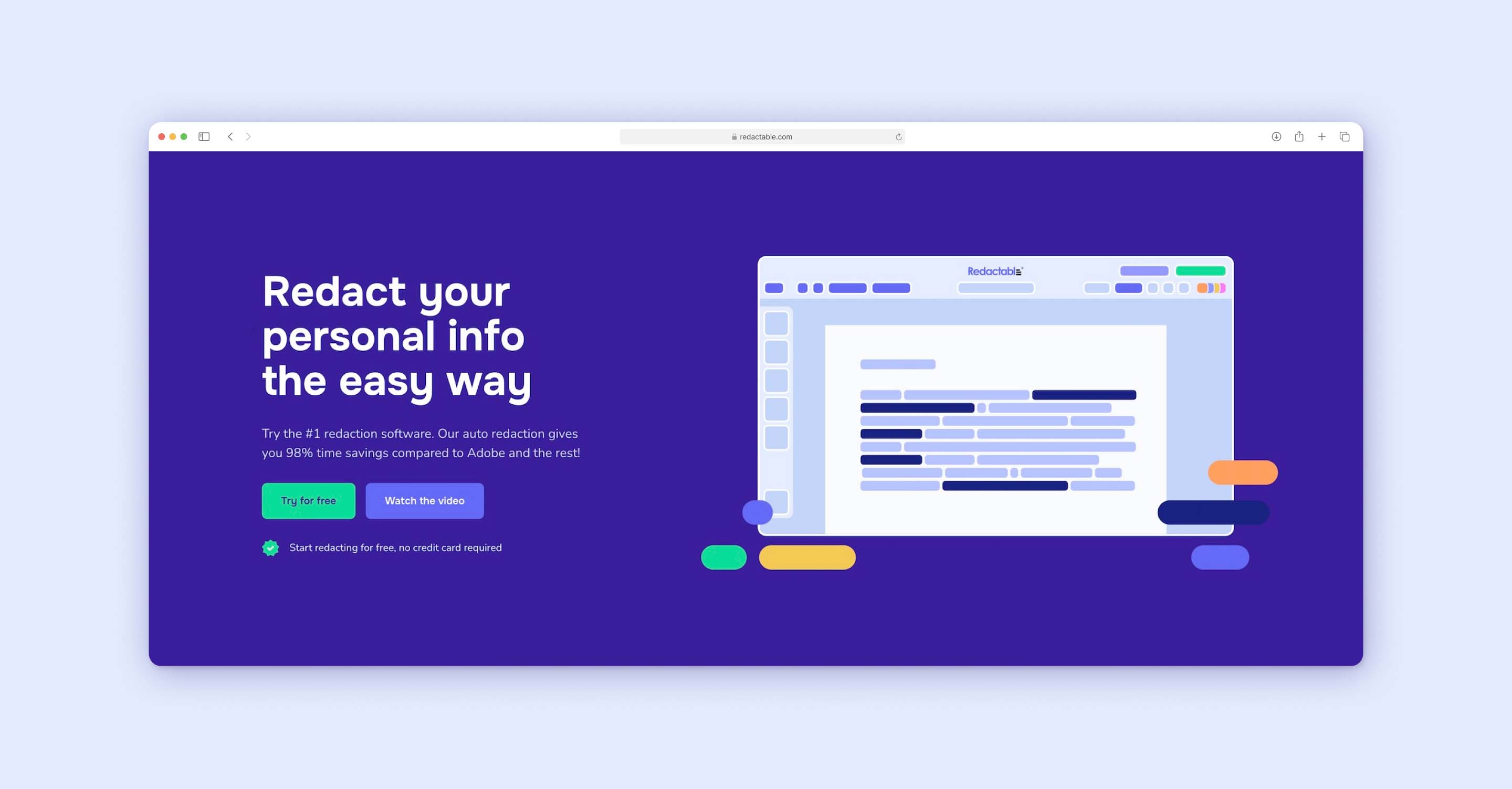
Here are four reasons you should use Redactable for all your bank statement-redacting needs:
- Speed: From bank statements to utility bills and more, Redactable allows you to redact your bank statements quickly and easily. How fast? You can redact up to 10 pages in about 2.5 minutes on average using Redactable. You can also redact multiple documents at once.
- Automated redaction: Redactable also offers users AI-powered automated redaction, enabling you to effectively and accurately redact several documents without missing a beat. By leveraging the power of AI, the tool highlights the sensitive information you need to redact in your bank document and even prompts you if you omit some details.
It also has OCR capabilities, which means it can help you redact scanned documents.
- Permanence: Another reason you should choose Redactable is that nobody other than you can reverse the redactions you make to your document. With Redactable, you can rest assured that any information you redact stays that way permanently. The platform also helps to hide metadata, conclusively ensuring that no third party can access your information.
- Versatility: Redactable integrates with several cloud-based services—including Google Drive, Box, and Dropbox—to ensure a seamless workflow for you.
Wrapping it up
Not everybody feels comfortable with their bank statements as they contain a lot of information we’d rather keep to ourselves. However, the current realities of business workflows and financial transactions mean we sometimes have to. So, what’s the middle ground? A redacted bank statement!
Redactable offers users an effective solution for sending bank statements and other documents while keeping their sensitive information secure.
With this user-friendly solution, you can redact large volumes of documents quickly and seamlessly. Try Redactable today and enjoy safety at speed.


